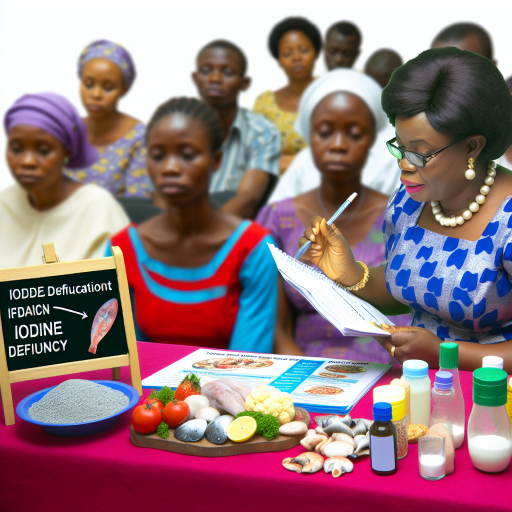Introduction
Minerals play a crucial role in maintaining good health.
They assist in bone formation, energy production, and immune function.
A balanced intake of minerals promotes overall well-being and prevents various health issues.
In Nigeria, mineral deficiencies are alarmingly prevalent.
Studies show that over 50% of children and pregnant women lack essential minerals.
Iron, zinc, and calcium deficiencies contribute to malnutrition and poor health outcomes.
Such deficiencies often stem from limited access to nutrient-rich foods and poor dietary choices.
This blog post aims to offer practical strategies to address these deficiencies.
By making smart dietary changes, you can improve your mineral intake effectively.
Focusing on local foods can make these changes simple and sustainable.
Understanding Mineral Deficiencies
Mineral deficiencies occur when the body lacks essential minerals for its proper functioning.
These minerals are vital for various physiological processes, including metabolism, bone health, and immune function.
Without adequate intake, the body cannot maintain its health, leading to a range of health issues.
In Nigeria, mineral deficiencies pose a critical public health challenge.
Many dietary patterns lack sufficient amounts of essential minerals.
This is primarily due to limited access to nutrient-rich foods, poor dietary diversity, and socioeconomic factors.
Below are some common mineral deficiencies in Nigeria:
Common Mineral Deficiencies in Nigeria
- Iron: Essential for the production of hemoglobin and prevention of anemia.
- Zinc: Crucial for immune system function and wound healing.
- Calcium: Important for bone health and muscle function.
- Iodine: Necessary for the production of thyroid hormones.
Symptoms and Health Risks Associated with Mineral Deficiencies
Identifying the symptoms of mineral deficiencies is crucial for timely intervention.
Each mineral deficiency has specific symptoms that can vary in severity.
Here are some common symptoms associated with each deficiency:
Iron Deficiency
- Fatigue and weakness.
- Paleness of skin.
- Dizziness or lightheadedness.
- Shortness of breath.
Zinc Deficiency
- Frequent infections.
- Skin rashes and lesions.
- Loss of appetite.
- Slow wound healing.
Calcium Deficiency
- Bone pain or tenderness.
- Muscle cramps.
- Height loss over time.
- Dental issues like tooth decay.
Iodine Deficiency
- Swelling of the thyroid gland (goiter).
- Fatigue and general weakness.
- Weight gain despite normal eating.
- Cold intolerance.
These symptoms can lead to serious health risks if left unaddressed.
For example, iron deficiency can result in anemia, while deficiency in iodine can lead to thyroid disorders.
Poor bone health associated with calcium deficiency can increase the risk of fractures.
Thus, understanding mineral deficiencies is vital for promoting better health outcomes.
Addressing these deficiencies requires action at various levels—individual, community, and government.
Nutrition education is essential in creating awareness about the importance of minerals.
A balanced diet can mitigate these deficiencies effectively.
Identifying Mineral Deficiencies in Your Diet
Mineral deficiencies can significantly impact your health.
Identifying these deficiencies early is crucial for optimal well-being.
In this section, we will explore the signs and symptoms of mineral deficiencies, the importance of nutritional assessments, and the value of consulting healthcare professionals.
Signs and Symptoms to Look Out For
Recognizing the signs and symptoms of mineral deficiencies is essential.
The following list outlines common indicators for various minerals:
- Iron Deficiency: Fatigue, weakness, brittle nails, and pale skin can indicate low iron levels.
- Magnesium Deficiency: Symptoms may include muscle cramps, mental disorders, and osteoporosis.
- Zinc Deficiency: Look for signs like decreased appetite, hair loss, and delayed wound healing.
- Calcium Deficiency: Symptoms include numbness, tingling in the extremities, and muscle cramps.
- Potassium Deficiency: This may manifest as weakness, fatigue, and muscle cramps.
Pay close attention to these signs.
They often indicate the need for dietary adjustments. In many cases, these symptoms will worsen if left unaddressed.
Tracking your health can lead to timely interventions.
Importance of Nutritional Assessments and Food Diaries
Nutritional assessments are vital for identifying mineral deficiencies.
They can help illuminate the dietary gaps you may have.
Keeping a food diary is an excellent method for monitoring your mineral intake.
Here’s how to implement this effectively:
- Record Meals: Write down everything you eat and drink each day.
- Note Portions: Be specific about portion sizes to gauge total intake accurately.
- Track Nutrient Intake: Utilize nutritional apps or websites to analyze your food records.
- Identify Patterns: Look for consistent deficiencies or excesses in your diet over time.
- Review with a Professional: Consider showing your food diary to a healthcare professional for assessment.
A food diary can reveal patterns that you may overlook.
You can identify your eating habits through consistent recording.
Analyzing this data can lead to informed dietary choices.
A nutritional assessment may include blood tests to check for deficiencies.
Consulting Healthcare Professionals for Diagnosis
When in doubt, consulting healthcare professionals is paramount.
They possess the expertise to diagnose deficiencies accurately.
Here are steps to take when seeking professional help:
- Schedule an Appointment: Visit a registered dietitian or physician for a comprehensive assessment.
- Discuss Symptoms: Provide a detailed account of your symptoms and dietary habits.
- Request Blood Tests: A doctor may recommend blood tests to check mineral levels.
- Follow Their Recommendations: Implement any advice or dietary changes suggested by the professional.
- Monitor Your Progress: Keep track of any changes in your health after making adjustments.
Healthcare professionals play a vital role in managing mineral deficiencies.
They can provide tailored advice to suit your specific needs.
Additionally, they may suggest supplements if dietary changes aren’t sufficient.
Regular monitoring and reassessment ensure the effectiveness of any new dietary strategies.
Unlock the Power of Nigerian Food Minerals
Discover personalized Food Advisory tailored to boost your health or business using expert insights on Nigerian minerals.
Get StartedIn fact, addressing mineral deficiencies involves recognizing symptoms, performing nutritional assessments, and consulting professionals.
By actively engaging with your health, you can make informed decisions regarding your diet.
Start by observing your body’s signals, maintaining a food diary, and reaching out to healthcare providers when necessary.
Taking these steps will significantly enhance your nutritional status and overall health.
Read: Copper & Manganese: Their Role in Nigeria’s Diet
Incorporating Mineral-Rich Foods
Addressing mineral deficiencies in the Nigerian diet starts with an understanding of the essential minerals our bodies need.
One effective way to enrich our diet is by incorporating mineral-rich foods.
Nigeria boasts a rich culinary tradition filled with various ingredients that provide essential minerals, crucial for maintaining overall health.
Overview of Traditional Nigerian Foods High in Essential Minerals
Nigerian cuisine includes several foods that are naturally rich in minerals.
Here’s a list of traditional foods that offer numerous health benefits:
- Ogbono (wild mango seeds): Rich in magnesium and potassium.
- Unripe plantains: A good source of potassium and iron.
- Beans: These legumes are high in iron, magnesium, and zinc.
- Green leafy vegetables: Such as spinach, scent leaves, and pumpkin leaves, which are great sources of iron, calcium, and folate.
- Fish: Both freshwater and saltwater fish provide iodine and omega-3 fatty acids.
- Groundnuts (peanuts): Rich sources of magnesium, zinc, and selenium.
- Fruit: Such as oranges and bananas provides potassium and vitamin C, which aids mineral absorption.
- Meat: Especially red meat, is an excellent source of iron and zinc.
Sources of Specific Minerals
Understanding specific minerals and their food sources can help address deficiencies in your diet.
Here are some key minerals and the foods rich in them:
Iron
Iron is crucial for transporting oxygen in the blood.
To boost iron intake, include:
- Dark leafy greens like spinach and kale.
- Beans and legumes, such as cowpeas and lentils.
- Meats like beef, liver, and chicken.
- Dried fruits, particularly apricots and figs.
Calcium
Important for bone health, you can increase calcium by consuming:
- Dairy products like cheese and milk.
- Leafy greens, particularly okra and pumpkin leaves.
- Fish with edible bones, such as sardines.
- Fortified foods like certain cereals.
Magnesium
Supports nerve function and energy production.
Good sources include:
- Nuts and seeds, especially groundnuts and sunflower seeds.
- Whole grains like millet and brown rice.
- Beans, including soybeans and kidney beans.
- Dark chocolate in moderation.
Potassium
Necessary for heart and muscle function, it can be sourced from:
- Fruits like bananas and oranges.
- Vegetables, especially potatoes and sweet potatoes.
- Beans and legumes.
- Whole grain products.
Iodine
Essential for thyroid health, you can include:
- Seafood such as fish and seaweed.
- Iodized salt as a simple dietary addition.
- Dairy products like milk and yogurt.
- Eggs, which contain small amounts of iodine.
Creative Ways to Add These Foods to Daily Meals
Incorporating mineral-rich foods into your meals doesn’t have to be dull.
Here are some creative ideas to include these essential foods in your daily diet:
- Add leafy greens to soups: You can enhance your soups by including spinach, pumpkin leaves, or scent leaves. They add nutrition and flavor.
- Make hearty stews: Prepare rich stews using beans, meat, and fish.
These ingredients provide essential minerals and make for a filling meal. - Prepare smoothies: Blend fruits with leafy greens for a delicious and nutritious drink.
Consider adding bananas, oranges, or pawpaw. - Snack on nuts: Keep roasted groundnuts on hand for a quick snack.
They are easy to prepare and rich in magnesium and zinc. - Experiment with whole grains: Substitute white rice with brown rice or millet.
These grains are high in fiber and essential minerals. - Utilize fish in meals: Cook fish with spices and tomatoes for a flavor-packed dish.
Try incorporating both freshwater and saltwater varieties. - Create salads: Combine ingredients like beans, nuts, and colorful vegetables for a nutrient-dense meal.
Top with a light vinaigrette for added flavor. - Incorporate fortified foods: When choosing cereals or other packaged foods, look for options fortified with vitamins and minerals.
By understanding and embracing the mineral-rich foods in our traditional diet, we can effectively address mineral deficiencies.
Consistently including these foods in creative ways allows for a balanced and nutritious diet.
Regularly assessing your dietary choices can lead to a healthier lifestyle and improved overall well-being.
Read: Balancing Diets: How to Get Diverse Minerals in Nigeria

Supplementing Mineral Intake
When dietary sources are insufficient, mineral supplements can help address deficiencies.
Captivate Your Audience with Exclusive Nigerian Food Content
Imagine your platform enriched with unique, mineral-rich Nigerian cuisine stories that no one else can offer. Let's create content that resonates deeply and sets you apart.
Get StartedHere’s how to use them safely and effectively:
Types of Mineral Supplements
- Multivitamins: These contain a blend of essential minerals and vitamins. They are ideal for general support.
- Single Mineral Supplements: Focused on one mineral, such as calcium, iron, or magnesium. They target specific deficiencies.
- Mineral Complexes: Combine several minerals in one supplement. They offer a balanced approach.
- Liquid Supplements: Easier to digest for some people and may be absorbed faster.
- Chewable Tablets: Useful for those who have difficulty swallowing pills.
Usage Guidelines
- Follow Dosage Instructions: Always adhere to the recommended dosage on the label. Excessive intake can cause health issues.
- Take with Food: Some minerals are better absorbed when taken with meals. Check specific recommendations for each supplement.
- Monitor for Side Effects: Common side effects include nausea or digestive discomfort. Report persistent issues to a healthcare provider.
Safety Precautions
- Consult a Healthcare Provider: Before starting any supplement, discuss it with your doctor. They can help determine if it’s necessary.
- Check for Interactions: Supplements can interact with medications or other supplements. Your healthcare provider can guide you on potential interactions.
- Be Aware of Overdose Risks: High doses of certain minerals, like iron, can be toxic. Adhere to recommended limits.
Importance of Consultation
- Personalized Advice: A healthcare provider can offer advice tailored to your health needs and dietary restrictions.
- Monitor Health Status: Regular check-ups ensure that your supplement regimen is effective and safe.
- Adjust as Needed: Your healthcare provider can adjust your supplement intake based on ongoing assessments and health changes.
Supplementing mineral intake can help address deficiencies when dietary sources fall short.
Always prioritize safety and consult with a healthcare provider to ensure your supplementation plan supports your overall health.
Read: Balancing Minerals: Tips for a Healthier Nigerian Diet
Enhancing Mineral Absorption
To effectively address mineral deficiencies in the Nigerian diet, enhancing the absorption of these essential nutrients is crucial.
Many foods contain minerals, but the body often struggles to absorb them efficiently.
This section provides practical tips for improving the bioavailability of minerals from food.
Tips for Improving Bioavailability
Making simple adjustments to your diet can significantly improve mineral absorption.
Here are several effective strategies:
- Consume vitamin C-rich foods alongside iron sources: Foods high in vitamin C enhance iron absorption.
Include items like oranges, tomatoes, or bell peppers with your meals. - Incorporate probiotics: Foods like yogurt and fermented foods can improve gut health.
A healthy gut can enhance nutrient absorption, including minerals. - Avoid calcium-rich foods when eating iron-rich meals: Calcium can inhibit iron absorption.
Space out consumption of milk or cheese from your iron sources. - Limit phytate-containing foods: Foods like unrefined grains and legumes contain phytates, which can bind minerals.
Soaking or fermenting these foods can reduce phytate levels and enhance mineral bioavailability. - Cook with acidic ingredients: Using vinegar or lemon juice in cooking can increase the availability of minerals from food.
Acidic environments help dissolve minerals and make them easier for the body to absorb.
The Role of Complementary Foods
Complementary foods play a vital role in enhancing mineral absorption.
Pairing certain foods can maximize the nutrient benefits.
Incorporate the following combinations for better mineral uptake:
- Iron-rich beans and citrus fruits: Enjoy a bowl of beans topped with salsa made from tomatoes and lime for an iron boost and vitamin C.
- Dark leafy greens and nuts: Combine spinach or kale with almonds or walnuts. This increases both iron and calcium intake.
- Fish and ginger: Include fish dishes with ginger. This not only adds flavor but also helps with the absorption of essential minerals like zinc.
- Whole grains and legumes: Pair brown rice with lentils or peas. This recipe increases the overall nutrient profile and enhances availability.
- Eggs with fresh vegetables: Employ vegetables that are rich in vitamin A alongside eggs to improve iron absorption.
Cooking Methods that Preserve Mineral Content
How you cook your food significantly influences the mineral content.
Some cooking methods may lead to nutrient losses, while others help retain minerals.
- Steaming vegetables: Steaming helps preserve most minerals since it avoids direct contact with water.
- Microwaving: Use the microwave with minimal water. This quick cooking method can help retain more minerals compared to boiling.
- Baking: Baking foods like sweet potatoes preserves their mineral content compared to boiling.
- Roasting: Roasting vegetables can concentrate their flavors and nutrients, making them more enjoyable and nutritious.
- Minimizing cooking times: Reduce cooking times when preparing vegetables to preserve minerals. Quick blanching or sautéing can suffice.
In essence, enhancing mineral absorption requires a thoughtful approach to food pairing and cooking methods.
Small changes in how you eat and prepare your meals can lead to significantly better mineral uptake.
Incorporate these strategies into your daily nutritional practices, ensuring that you address any mineral deficiencies in your diet effectively.
The Nigerian diet offers many opportunities to enhance mineral absorption.
With proper modifications and careful selection of complementary foods, it becomes easier to maintain and improve your overall health.
Always remember that what you choose to eat matters just as much as how you prepare it.
Read: Why Minerals Matter: Their Role in Our Diet
Community and Educational Resources
Addressing mineral deficiencies in Nigeria requires a collective effort.
Community involvement plays a vital role in improving nutritional health.
When communities collaborate, they can effectively identify and address specific nutritional challenges.
These challenges often vary significantly across different regions.
Importance of Community Involvement
Community involvement strengthens local capacity to combat mineral deficiencies.
It fosters collective responsibility among members.
Here are several benefits of active community participation:
- Awareness Raising: Communities can run educational programs about the importance of minerals.
- Resource Sharing: Local groups can share resources, such as seeds or educational materials.
- Local Knowledge: Community members often possess valuable knowledge about available local foods rich in essential minerals.
- Support Networks: Involvement fosters support networks that encourage healthy eating and lifestyle changes.
- Advocacy: Communities can advocate for better nutritional policies at local and national levels.
The willingness of individuals to engage with one another leads to greater solutions.
Through collaboration, communities can create sustainable solutions to mineral deficiencies.
Regular meetings, workshops, and informational sessions can promote awareness about nutrition.
Local Programs and NGOs
Numerous local programs and NGOs focus on improving nutrition in Nigeria.
These organizations educate communities about the importance of minerals.
They also provide resources for better nutrition practices.
Below are some prominent organizations and programs:
- HarvestPlus: This program concentrates on biofortification. It develops crops enriched with vitamins and minerals.
- The Global Alliance for Improved Nutrition (GAIN): GAIN works to improve nutrition standards and practices in Nigeria.
- Nutrition Society of Nigeria (NSN): NSN conducts research and provides guidelines for better nutrition.
- Food and Agriculture Organization (FAO): FAO supports local agriculture initiatives to improve food security.
- MamaYe: This initiative focuses on maternal and child health, emphasizing the importance of minerals during pregnancy and early childhood.
These organizations offer various resources to empower local communities.
They conduct workshops, provide educational materials, and help create community gardens.
By working with these groups, communities can gain essential knowledge about nutrition.
Resources for Further Education
Education plays a significant role in addressing mineral deficiencies.
Several resources can help individuals and communities learn more about nutrition.
These resources include online platforms, literature, and workshops.
Below are some recommended resources:
- Books: Consider reading “Nutrition and Health in Nigeria“ for a comprehensive overview.
- Websites: Visit the World Health Organization for guidelines on nutrition.
- Online Courses: Platforms like Coursera offer courses on nutrition basics.
- Local Workshops: Community centers often host workshops on nutrition. Attend these to learn directly from experts.
- Social Media: Follow organizations on platforms like Twitter and Facebook for regular updates and tips.
Access to these educational resources can empower individuals with the information they need.
Knowledge is key to making informed dietary choices.
Discussing what you learn with friends and family can further enhance community awareness.
Promoting Local Food Sources
Encouraging the consumption of locally available foods helps address mineral deficiencies.
Many Nigerian foods are rich in essential minerals.
Below is a list of local foods that can enrich your diet:
- Pulses: Beans and lentils are high in iron and protein.
- Leafy Greens: Vegetables like spinach and ugu (fluted pumpkin) are packed with vitamins.
- Nuts and Seeds: Groundnuts and sunflower seeds provide healthy fats and minerals.
- Seafood: Fish and shellfish are excellent sources of iodine and omega-3 fatty acids.
- Fruits: Bananas, oranges, and pawpaw offer vital vitamins and minerals.
These foods not only enhance mineral intake but also support local farmers.
Purchasing locally grown produce stimulates the economy and encourages sustainable practices.
Creating a Supportive Environment
Creating an environment that promotes healthy nutrition is essential.
Community gardens can serve as excellent platforms for education and food production.
Here are some steps to foster a supportive environment:
- Establish Community Gardens: Encourage families to grow their own fruits and vegetables.
- Organize Food Drives: Collect non-perishable food items rich in minerals for community distribution.
- Conduct Nutritional Workshops: Host sessions focused on meal planning and preparation.
- Collaborate with Local Health Workers: Involve healthcare professionals to provide nutritional advice.
- Utilize Public Spaces: Use parks or community centers for food-related events and education.
These steps help create awareness about the importance of nutrition.
They can also generate enthusiasm among community members.
By working together, communities can effectively tackle mineral deficiencies.
In general, addressing mineral deficiencies in Nigeria requires a community-centric approach.
By highlighting the importance of local initiatives and education, we can set the stage for effective solutions.
Together, communities can promote better nutrition and enhance the well-being of all members.
Conclusion
Addressing mineral deficiencies in the Nigerian diet is crucial for maintaining overall health.
Mineral deficiencies can lead to various health issues, such as weakened immunity and poor bone health.
Incorporating mineral-rich foods into daily meals is essential for preventing these problems.
To achieve long-term health benefits, adopt sustainable dietary practices.
Include diverse sources of minerals like leafy greens, legumes, nuts, and seeds.
Consider fortifying diets with supplements if needed, but always consult a healthcare provider first.
Make informed choices about your diet by:
- Researching mineral-rich foods
- Monitoring your mineral intake
- Seeking professional guidance when necessary
Engage with your community for additional support.
Local nutritionists and health groups can provide valuable advice.
By working together, you can overcome mineral deficiencies and improve overall well-being.
Prioritize your health by staying informed and making proactive dietary adjustments.




